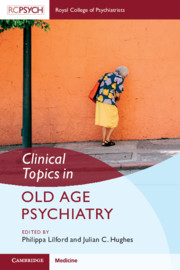Book contents
- Clinical Topics in Old Age Psychiatry
- ‘Clinical Topics In … ’
- Clinical Topics in Old Age Psychiatry
- Copyright page
- Dedication
- Contents
- Contributors
- Preface
- Acknowledgement
- Editors’ Note
- Abbreviations
- Introductory Comments
- Section 1 Epidemiology and Types of Disorders
- Section 2 Assessment and Investigations
- Section 3 Approaches to Management
- Chapter 14 Supporting Self-Management in Early Dementia
- Chapter 15 What Can Person-Centred Care in Dementia Learn from the Recovery Movement?
- Chapter 16 Psychosocial Interventions in Dementia
- Chapter 17 Palliative Care in Dementia
- Chapter 18 Review of Treatment for Late-Life Depression
- Chapter 19 Reducing the Healthcare Burden of Delirium
- Chapter 20 Controlling the Confusion
- Section 4 Law, Ethics, and Philosophy
- Index
- References
Chapter 18 - Review of Treatment for Late-Life Depression
from Section 3 - Approaches to Management
Published online by Cambridge University Press: 12 September 2020
- Clinical Topics in Old Age Psychiatry
- ‘Clinical Topics In … ’
- Clinical Topics in Old Age Psychiatry
- Copyright page
- Dedication
- Contents
- Contributors
- Preface
- Acknowledgement
- Editors’ Note
- Abbreviations
- Introductory Comments
- Section 1 Epidemiology and Types of Disorders
- Section 2 Assessment and Investigations
- Section 3 Approaches to Management
- Chapter 14 Supporting Self-Management in Early Dementia
- Chapter 15 What Can Person-Centred Care in Dementia Learn from the Recovery Movement?
- Chapter 16 Psychosocial Interventions in Dementia
- Chapter 17 Palliative Care in Dementia
- Chapter 18 Review of Treatment for Late-Life Depression
- Chapter 19 Reducing the Healthcare Burden of Delirium
- Chapter 20 Controlling the Confusion
- Section 4 Law, Ethics, and Philosophy
- Index
- References
Summary
In 2018, Public Health England reported that one in five older people living in the community and two in five older people living in care homes are affected by depression. These symptoms are associated with reduced quality of life and high morbidity, and also with increased mortality through suicide and self-neglect. A 2014 study showed that major depression was associated with a 43% increase in the risk of non-suicide-related mortality in adults over the age of 50. Depression across all age groups has a detrimental impact on recovery from surgery and in older people, increases the risk of coronary heart disease and stroke., There is a gathering body of evidence that depression is a risk factor for dementia and, that in people with mild cognitive impairment, the presence of depression may increase the risk of progression to dementia.
- Type
- Chapter
- Information
- Clinical Topics in Old Age Psychiatry , pp. 243 - 253Publisher: Cambridge University PressPrint publication year: 2020



